Looking for GKS Graduate Scholarship Information? Check here - GKS Graduate 2026
2026 Global Korea Scholarship Application Guidelines for Undergraduate Degrees
Have been announced by NIIED and Korean embassy in India. Both university and embassy track applications are open for Indian students who want to pursue their Undergraduate Degree in Korea. In this article, we will provide you with all the details that you need to know about the GKS 2025 application process.
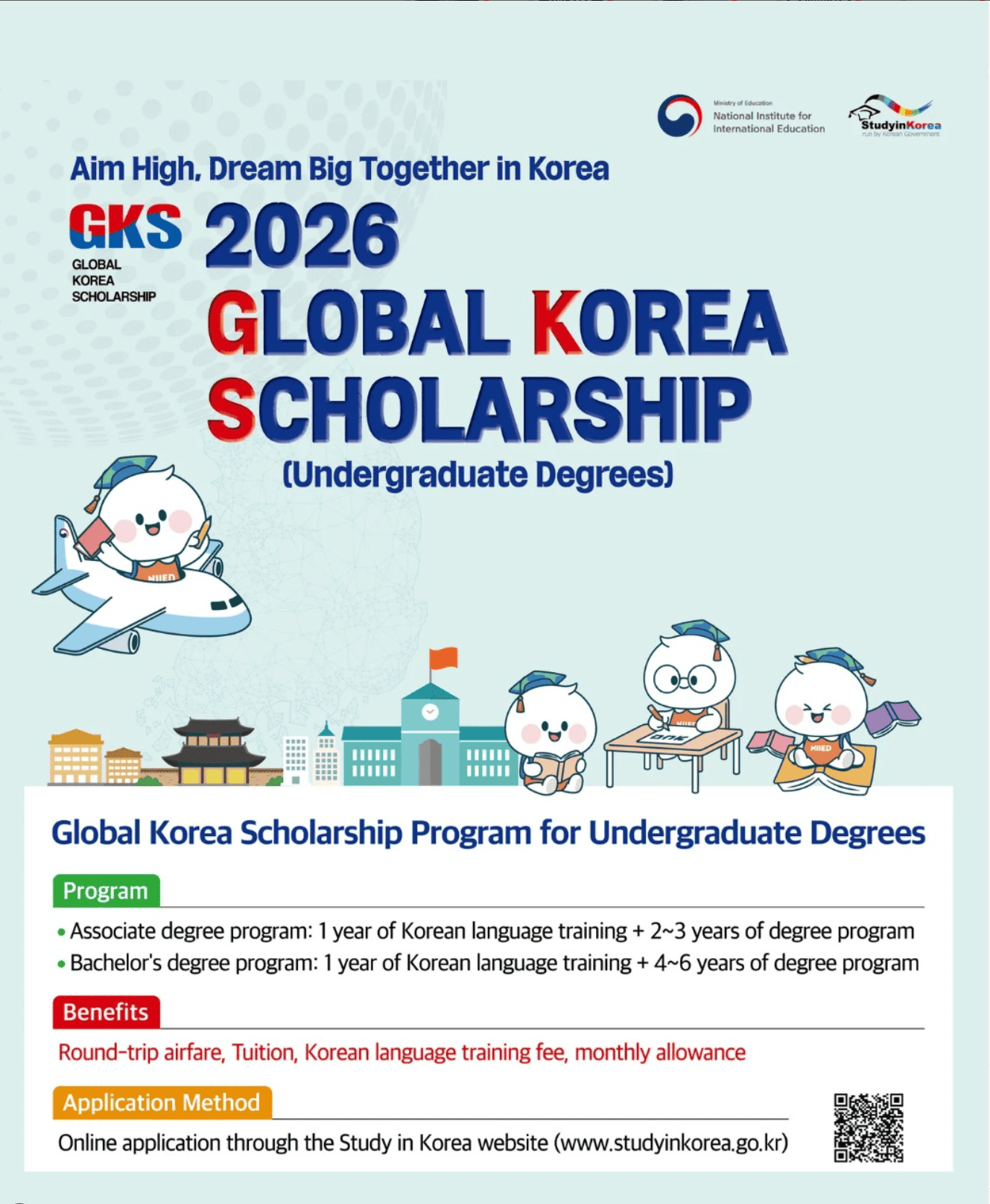
SCHOLARSHIP OBJECTIVES
○ Global Korea Scholarship is designed to provide international students with opportunities to study at higher educational institutions in Korea in pursuit of academic degrees, which will enhance international education exchange and deepen mutual friendship between Korea and participating countries.
※ As Korean Government Scholarship Program have been integrated and branded as Global Korea Scholarship in 2010, the name has been changed to GKS (Global Korea Scholarship)
PROGRAMS AND UNIVERSITIES
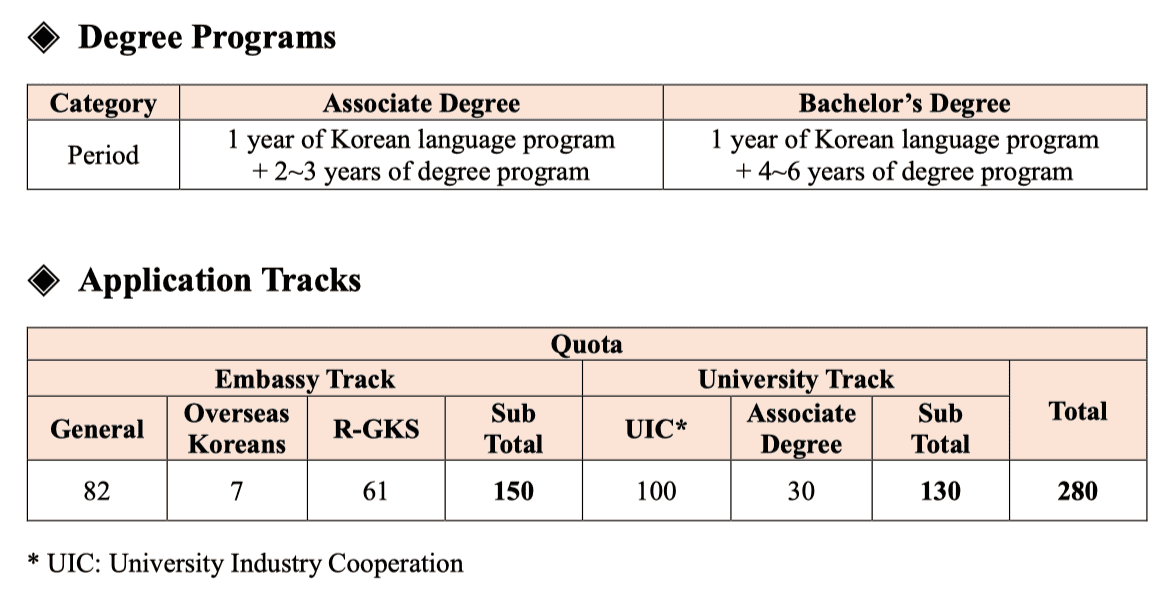
◈ Available Universities and Fields of Study
○ Available Fields of Study
- All fields of study offered by GKS participating universities
- Academic programs offered during evenings (night school), short-term programs, online and distant-learning programs are not applicable in this scholarship program
- Applicants can only apply to the universities and departments that are listed in the ‘University Information’ file attached under the GKS Notice post in Study in Korea website (www.studyinkorea.go.kr > Plan your studies > GKS Notice)
◈ Available Universities and Fields of Study (Divisions)
○ Available Universities
- Embassy Track
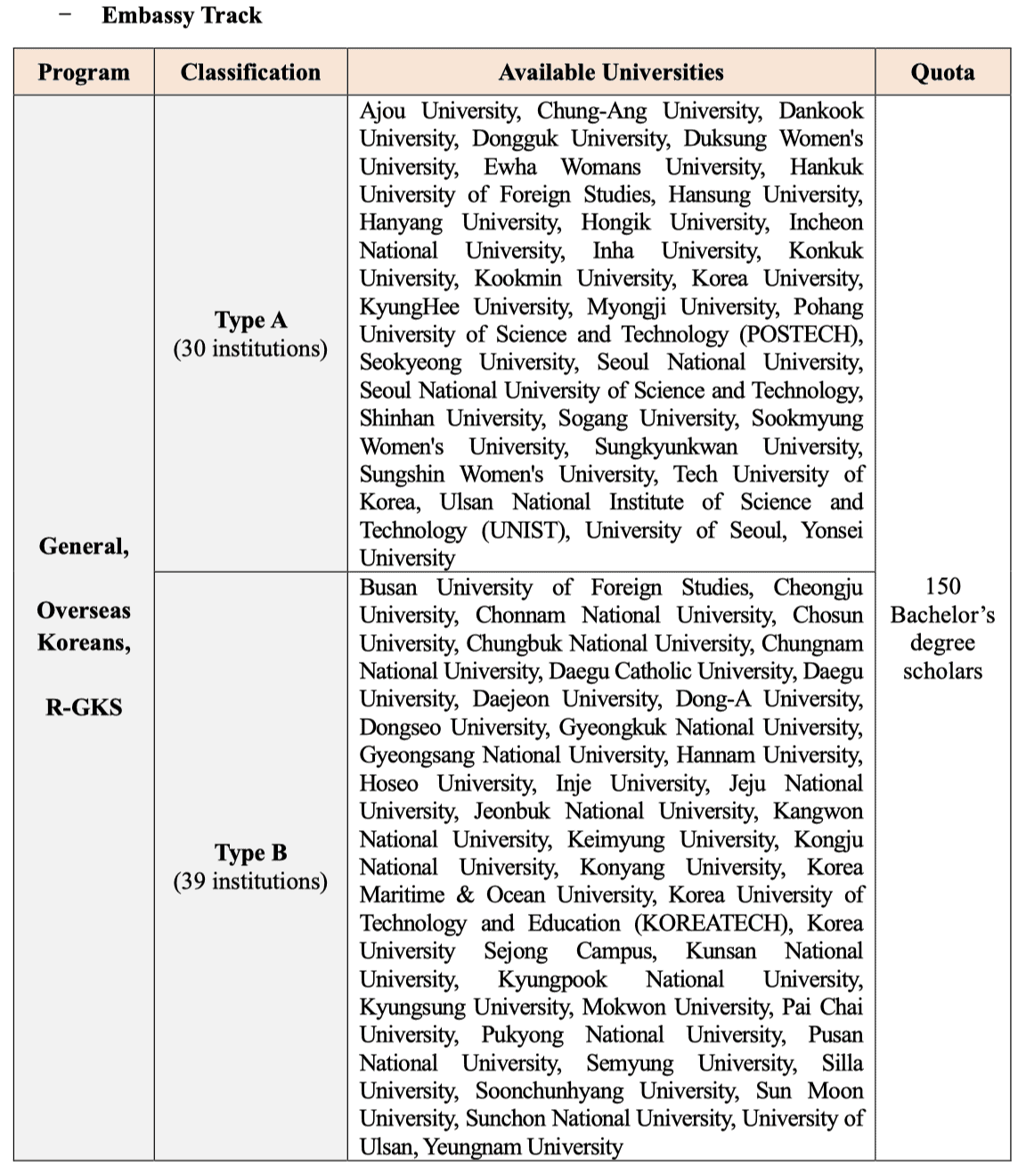
※ For the General and Overseas Korean program of the Embassy Track, applicants choose up to THREE different universities in any order of preference and MUST apply to at least one of the universities from Type B.
※ For the R-GKS program of the Embassy Track, applicants can choose up to TWO different universities from Type B universities.
- University Track
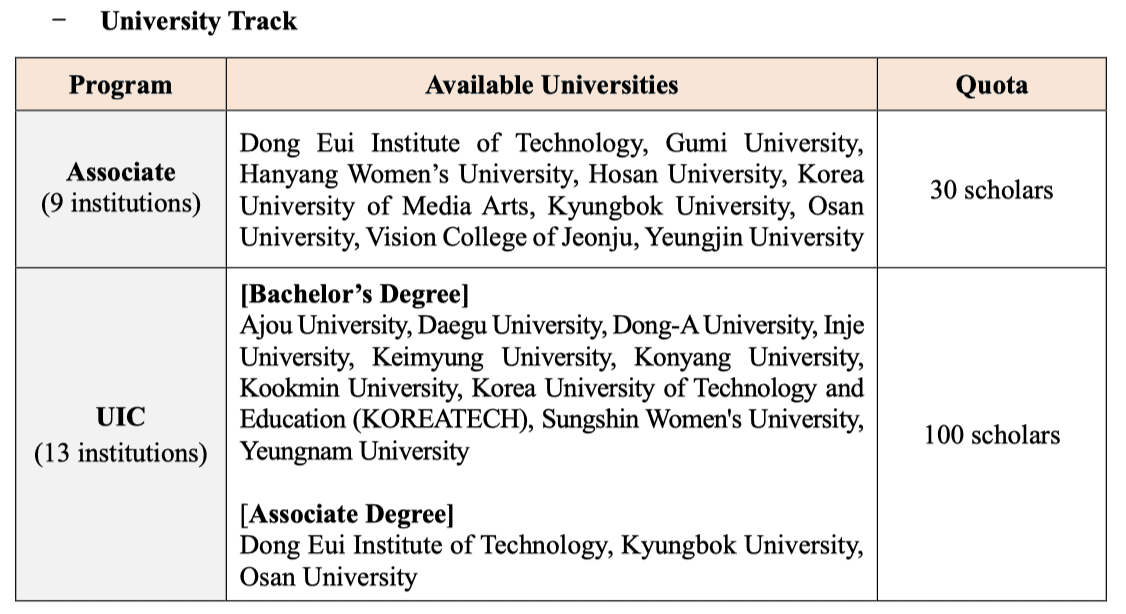
※ The UIC Program under University Track provides customized curriculum and field experience through industry-university cooperation focused on the fields of natural science and engineering
PROGRAM QUOTA
◈ Embassy Track: 150 scholars from 71 countries
○ General: 82 Scholars from 71 countries
○ Overseas Koreans: 7 Scholars from 7 countries
○ R-GKS: 61 Scholars from 56 countries
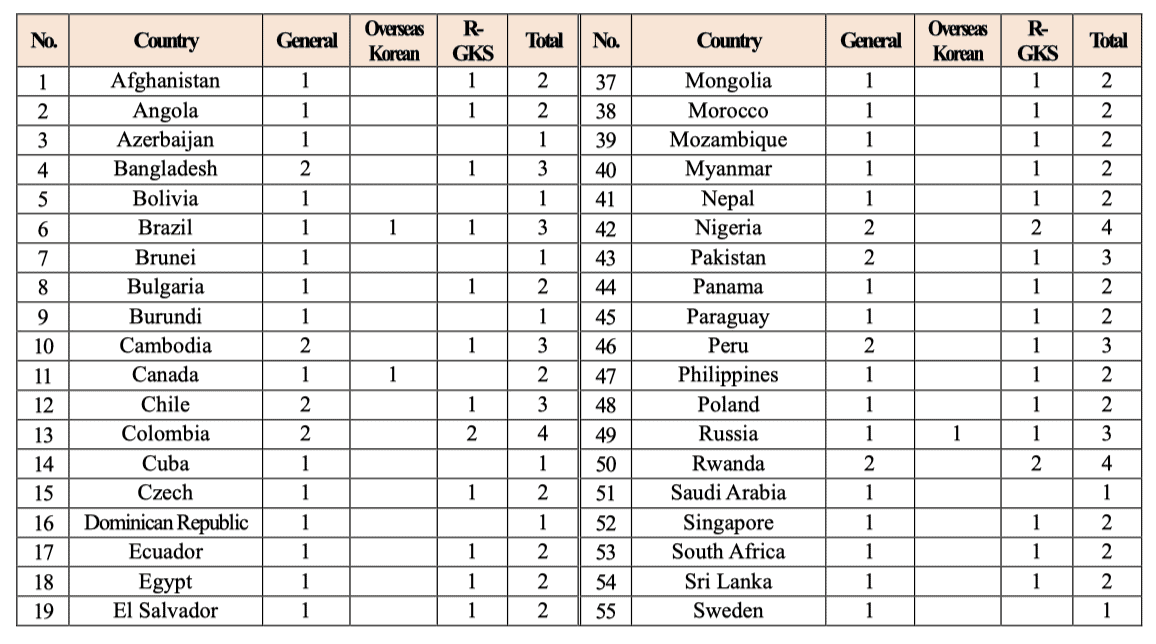
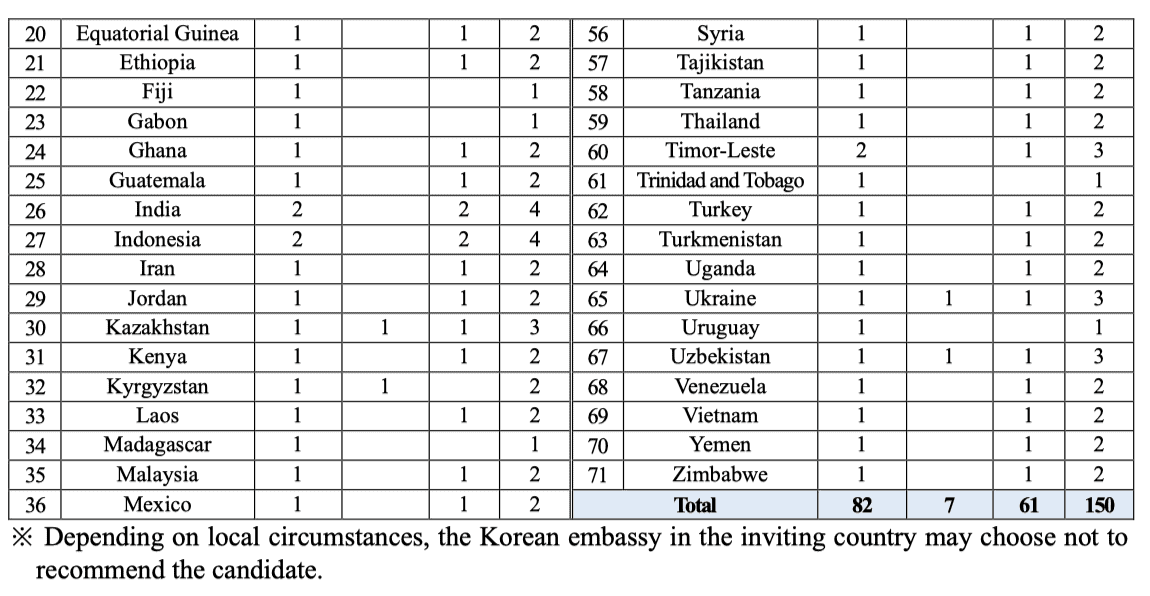
◈ University Track
○ Associate Degree: 30 scholars from 71 countries
○ University Industry Cooperation (UIC) Program: 100 scholars
※ UIC Program is open to all countries around the world
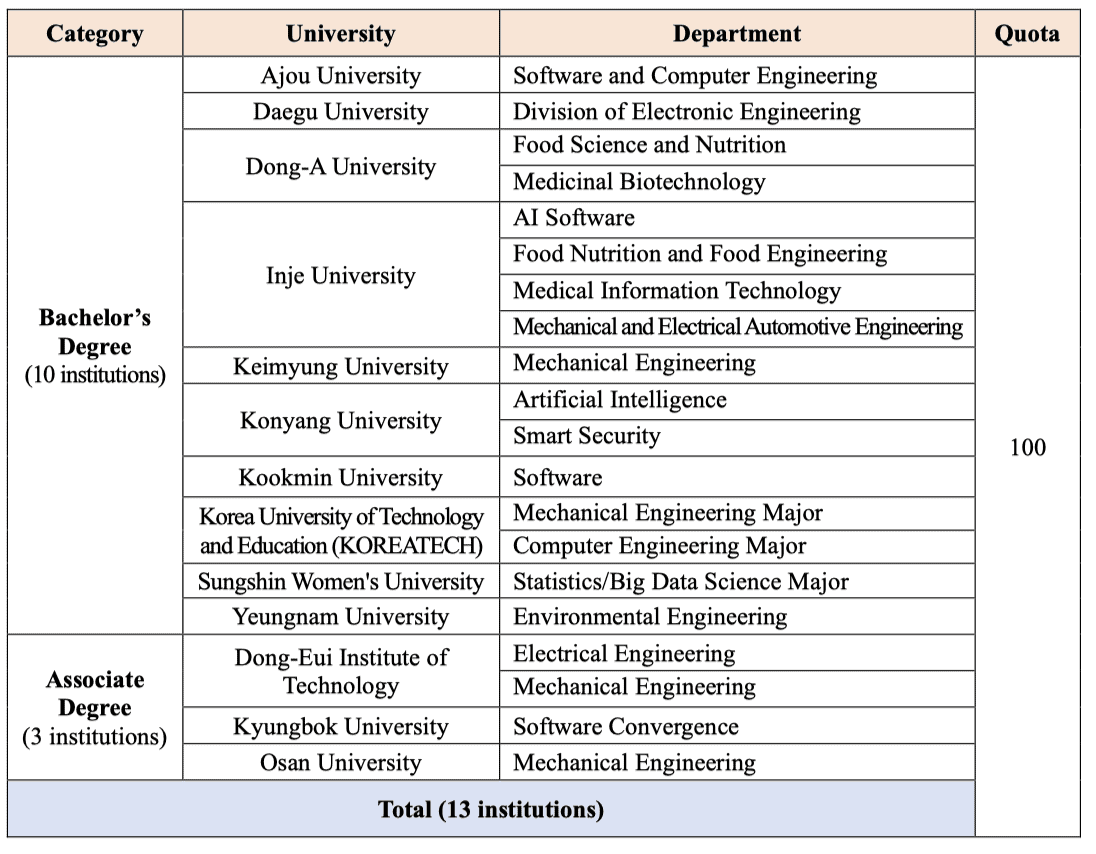
ELIGIBILITY CRITERIA
NATIONALITY-
LEVEL OF EDUCATION-
-Bachelor's degree program is for applicants who graduated (or are expected to graduate) from a high school or from an associate degree program.
- Associate degree program is for applicants who graduated (or are expected to graduate) from a high school.
- Applicants who have a bachelor's degree cannot apply. Applicants who have associate degree can only apply to a bachelor's program .
- Applicants who are expected to graduate (as of December 31, 2024) must first submit a certificate of expected graduation at the time of application. If such applicants pass the first round of selection, they must submit a graduation certificate (or a degree certificate) by December 31, 2024. Failure to do so will result in the cancellation of your acceptance.
- Applicants who submit their provisional graduation certificate will be considered as applicants who are expected to graduate.
GRADES-
- Cumulative Grade Point Average (CGPA) of the entire curriculum from the previous (degree) program must meet one of the two conditions below;
- Score percentile should be 80% or above on a 100-point scale or be ranked within the top 20% within one's class .
- CGPA must be equal to or above 2.64/4.0, 2.80/4.3, 2.91/4.5 or 3.23/5.0.
※ Previous degree program for Associate degree program applicants: high school program.
※ Previous degree program for Bachelor's degree program applicants: high school program or associate degree program.
- If an applicant holds a transcript that does not provide CGPA information or is unable to convert his or her grades into any one of the accepted GPA scales (4.0, 4.3, 4.5, 5.0, or 100 point scale), then the applicant must submit additional documents officially issued by their respective school/university describing the institution's grading system.
- Applicants who are expected to graduate should calculate the most recent CGPA at the time of application.
AGE-
- Must be under 25 years of age (born after March 1, 2001).
HEALTH-
All applicants must be in good health, both mentally and physically, to study in Korea for the full duration of the program.
○ All applicants must have no grounds for disqualification (e.g., criminal history) for overseas travel
RESTRICTIONS-
○ A person who has graduated (or is expected to graduate) from a Korean high school (including international schools) or who has graduated (or is expected to graduate) from a Korean associate degree program is NOT eligible to apply.
- A person who graduated from an online curriculum arranged by a Korean school/university cannot apply.
- A person who is currently in their final year at a Korean high school or Korean university cannot apply.
○ A person who had previously received a scholarship for a degree program from the Korean government is NOT eligible to apply.
- A previous GKS scholar who has received a scholarship for a degree program.
- A previous GKS scholar whose scholarship was cancelled after their enrollment.
- A person who had previously received a scholarship for their degree program from another Korean government agency other than NIIED.
- A previous GKS scholar who has received scholarships from GKS Non-degree program for exchange students CAN apply.
- Cancellation of scholarship’ means a GKS scholar either withdraws from the program or his/her scholarship was forfeited during their scholarship period.
○ Former GKS degree program applicants who has withdrawn from the program or was disqualified from the scholarship after being selected as GKS scholars in recent three years cannot apply.
○ Duplicate Applicants
- Embassy track applicants who passed the first round of selection (including backup candidates) cannot apply again through a university track.
- Embassy track applicants must apply to only one program: 'General', 'Overseas Koreans' or the 'R-GKS' program.
- University track applicants must apply to only one program among UIC or Associate Degree programs. Each applicant must apply to ONE university and single department.
- If an applicant applied to more than one track/program/university, his or her application will be disregarded in the evaluation and the scholarship will be cancelled if found afterward.
- ◈ Application Method
○ Online application through the Study in Korea website (www.studyinkorea.go.kr)
- After registering membership on the website, proceed with the application process by filling out the required sections and uploading the necessary documents
- If a university requires additional documents (e.g., portfolio), applicants must submit those materials directly to the university
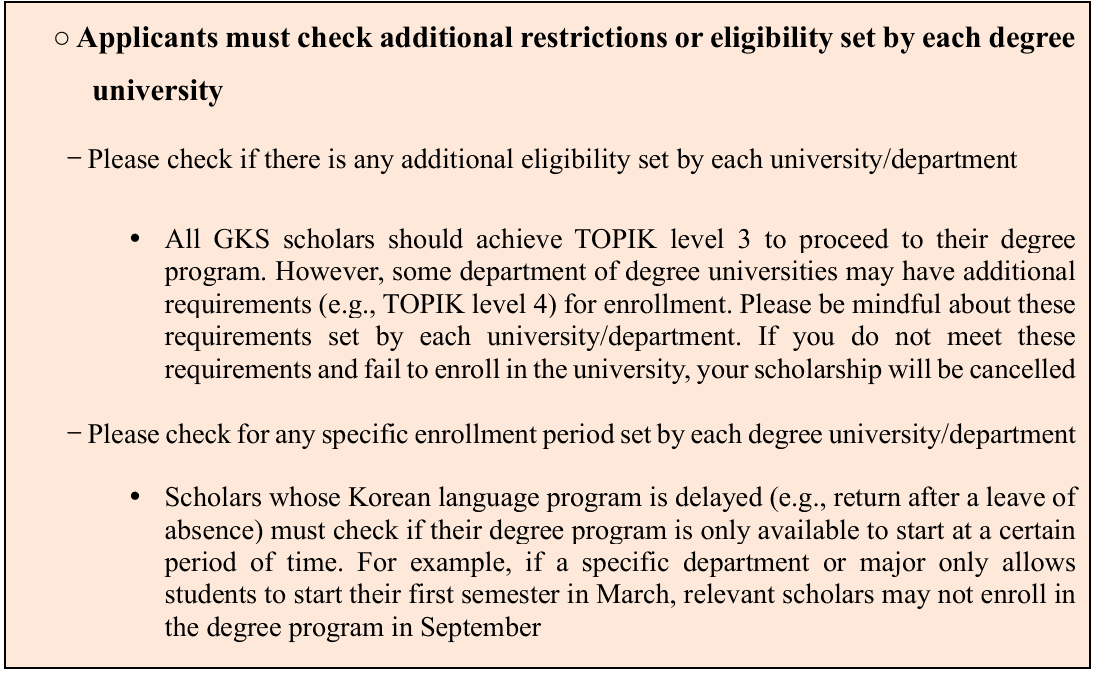
APPLICATION AND SELECTION
◈ Selection Procedure
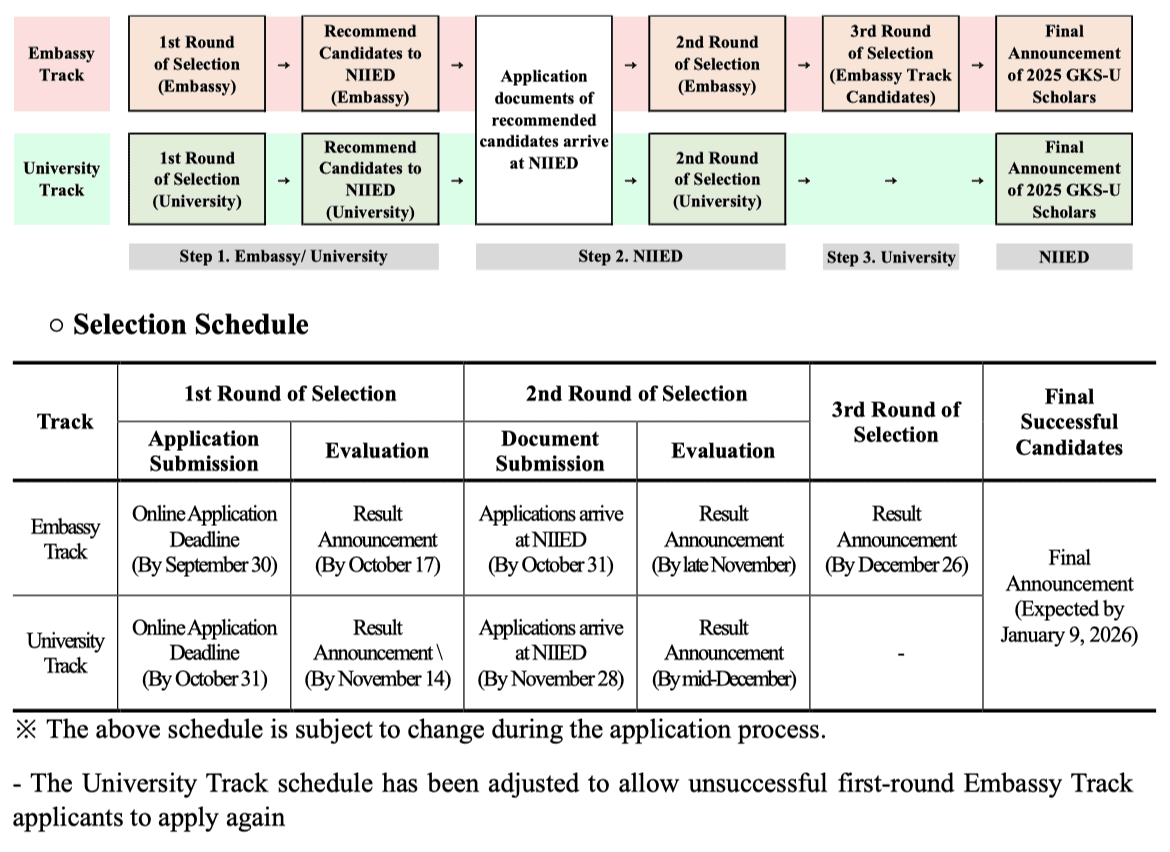
SELECTION TIMELINE:
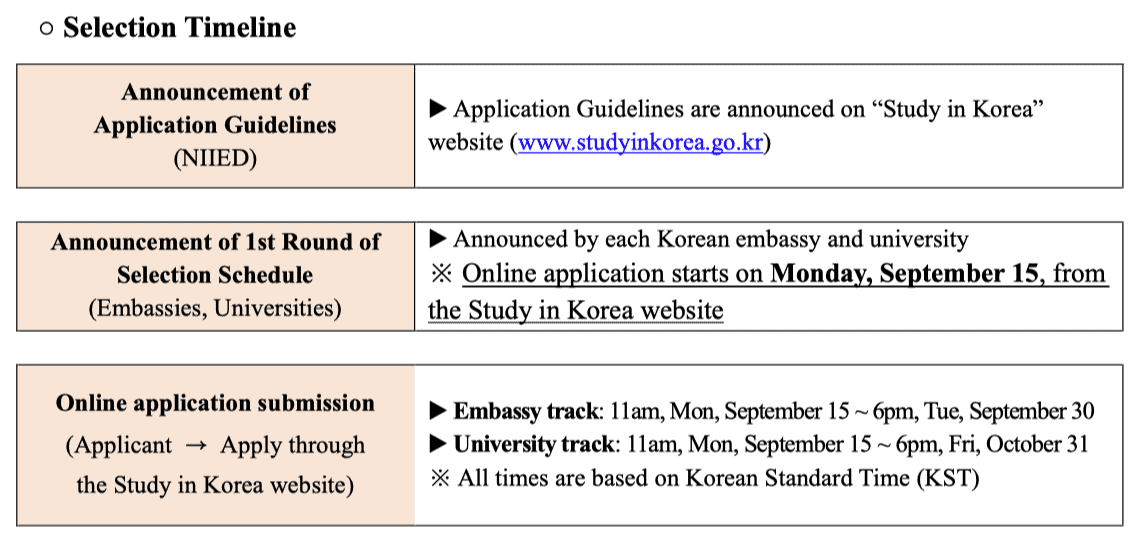
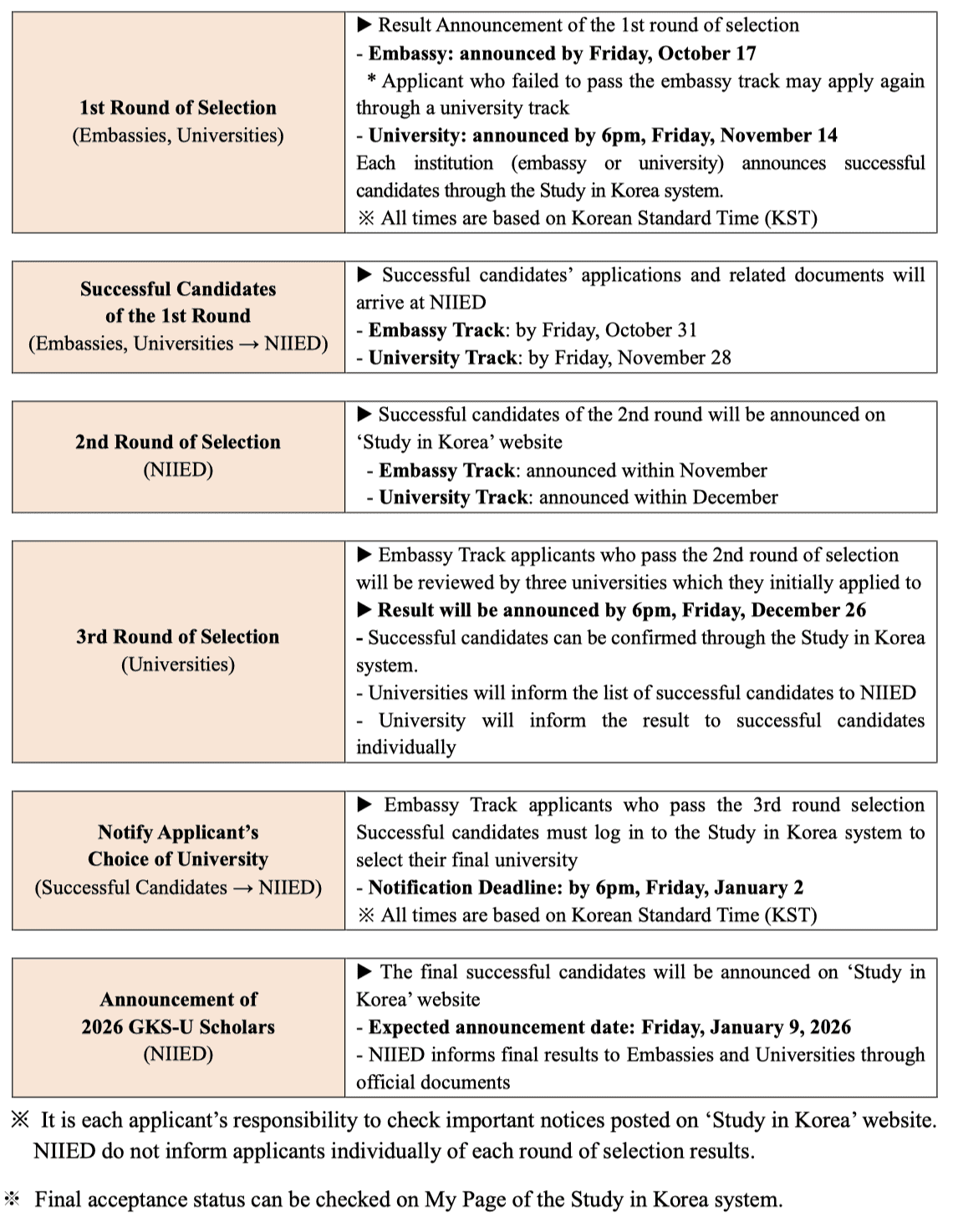
DOCUMENTS TO SUBMIT
○ Application period and method of submission
- Application period:
Each embassy and university has their own application deadline, so applicants must check with the respective institute before submitting application.
- Method of submission:
Each embassy and university who conducts the first round of selection may have their own document submission guidelines, so applicants must check with the respective institute before submitting application.
List of documents to submit
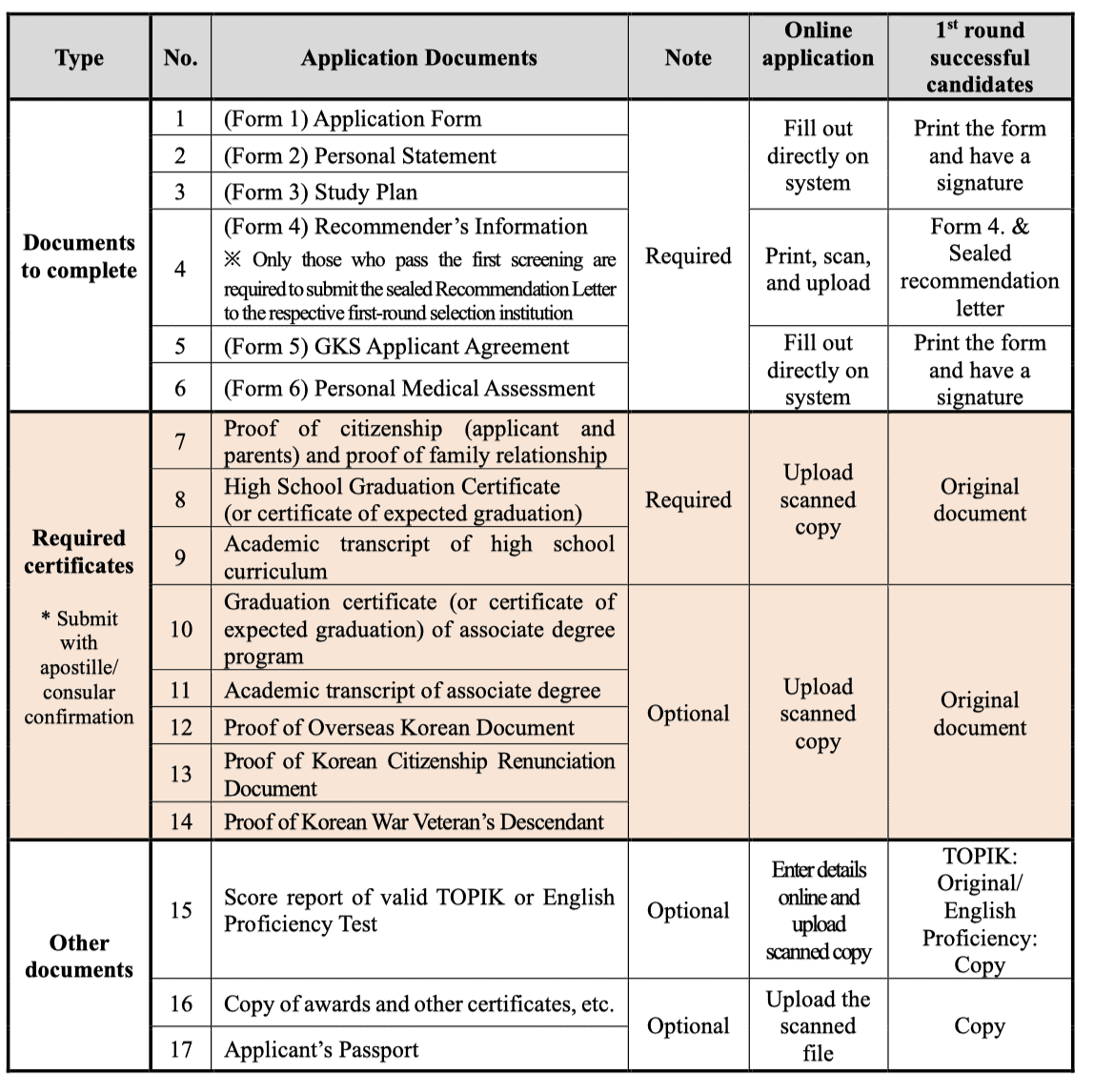
○ Document preparation for application
- Documents to complete: GKS Applicant Agreement, Application form, Personal Statement, Study Plan, Personal Medical Assessment, recommendation documents*
* Recommendation documents: recommender’s information (download the FORM 4. from the system), recommendation letter
- Required certificates: Graduation (or expected to graduate) certificate, academic transcript, proof of citizenship, proof of Overseas Korean document, etc.
- Application documents for the FIRST round of selection (embassy/university)
[Documents to complete * & Required certificates** ]
- Submission requirements: Documents submitted through the Korea Study in Korea System
※ The first round of selection institutions will determine whether or not to accept submitted documents. All applicant documents sent to NIIED for the second round of selection must meet the submission requirements for the second round of selection.
- Application documents for the SECOND round of selection (NIIED)
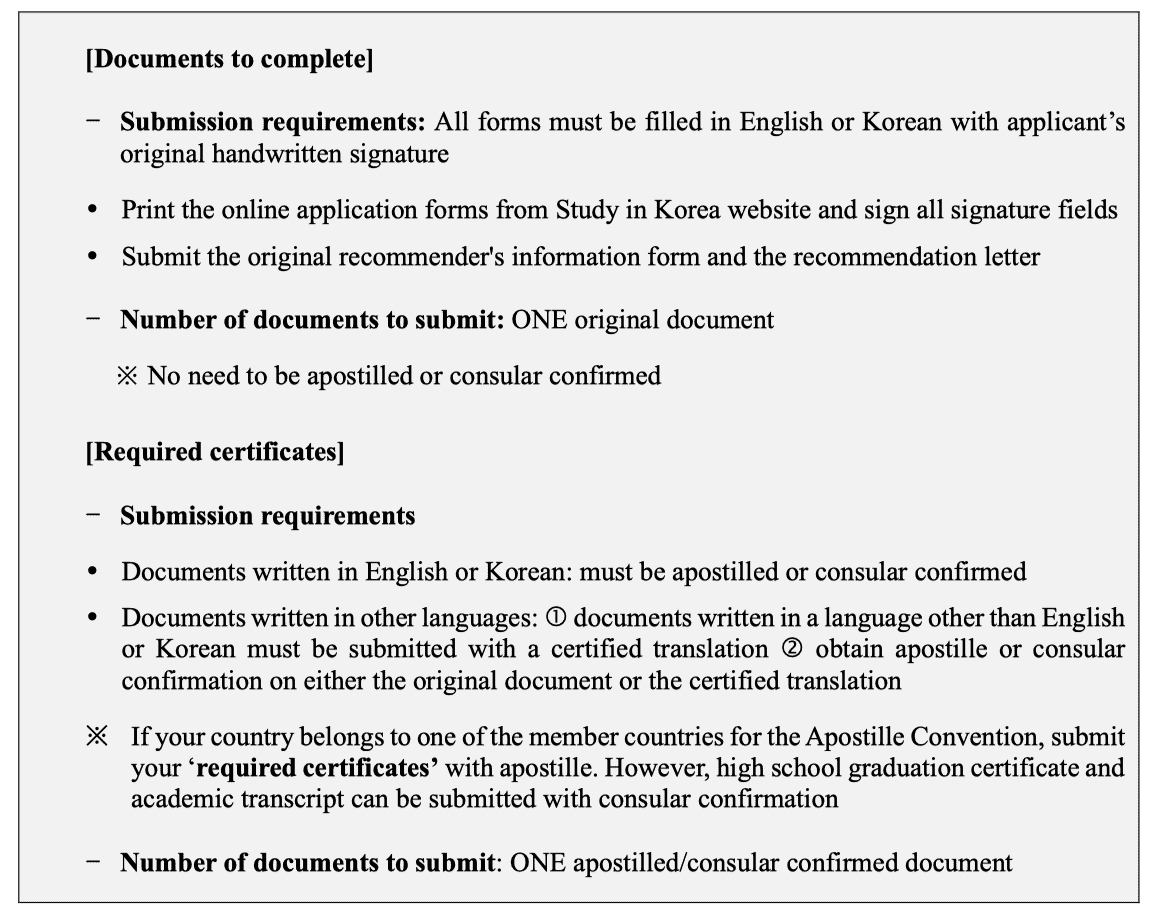
○ Things to note when preparing application documents
- Application documents for the FIRST round of selection
- All documents must be submitted in English or Korean.
- Please follow the submission guidelines set by each Korean embassy/university.
- Each embassy/university may simplify the submission of documents based on their selection procedure. Check with the embassy/university prior to submission.
- Application documents of the successful candidates of the first round must meet the submission requirements for the second round of selection upon arrival to NIIED.
- Application documents for the SECOND round of selection
- If any of the required documents are not submitted or if any of the application forms are submitted without applicant's signature, his or her application documents may be excluded from evaluation.
- If your document is unable to be re-issued, please keep the original and obtain an apostille (or 15 consular confirmation) on a notarized copy.
※ All application submitted to NIIED will not be returned in any case. (NIED stores the original application for a period of more than 5 years).
- Simple photocopies or notarized copies of the apostilled (or consular confirmed) documents are NOT accepted. However, a certified true copy (등본 인증) issued by a Korean embassy or a certified true copy issued by a government agency that issued the original apostille document will be accepted.
- If an applicant graduated from a third country, he or she can submit graduation certificate and academic transcript with consular confirmation issued by an embassy of the relevant country.
- Required certificates that are issued online must also be apostilled (or consular confirmed).
- If there is an expiration date on an apostilled or consular confirmed document, the validity of the document will be judged based on the date indicated on the authentication. If there is no specific date indicated, the document will be accepted if it was submitted within 2 years from the date of authentication.
- If a university requires additional documents (e.g., portfolio), applicants must submit those materials directly to the university.
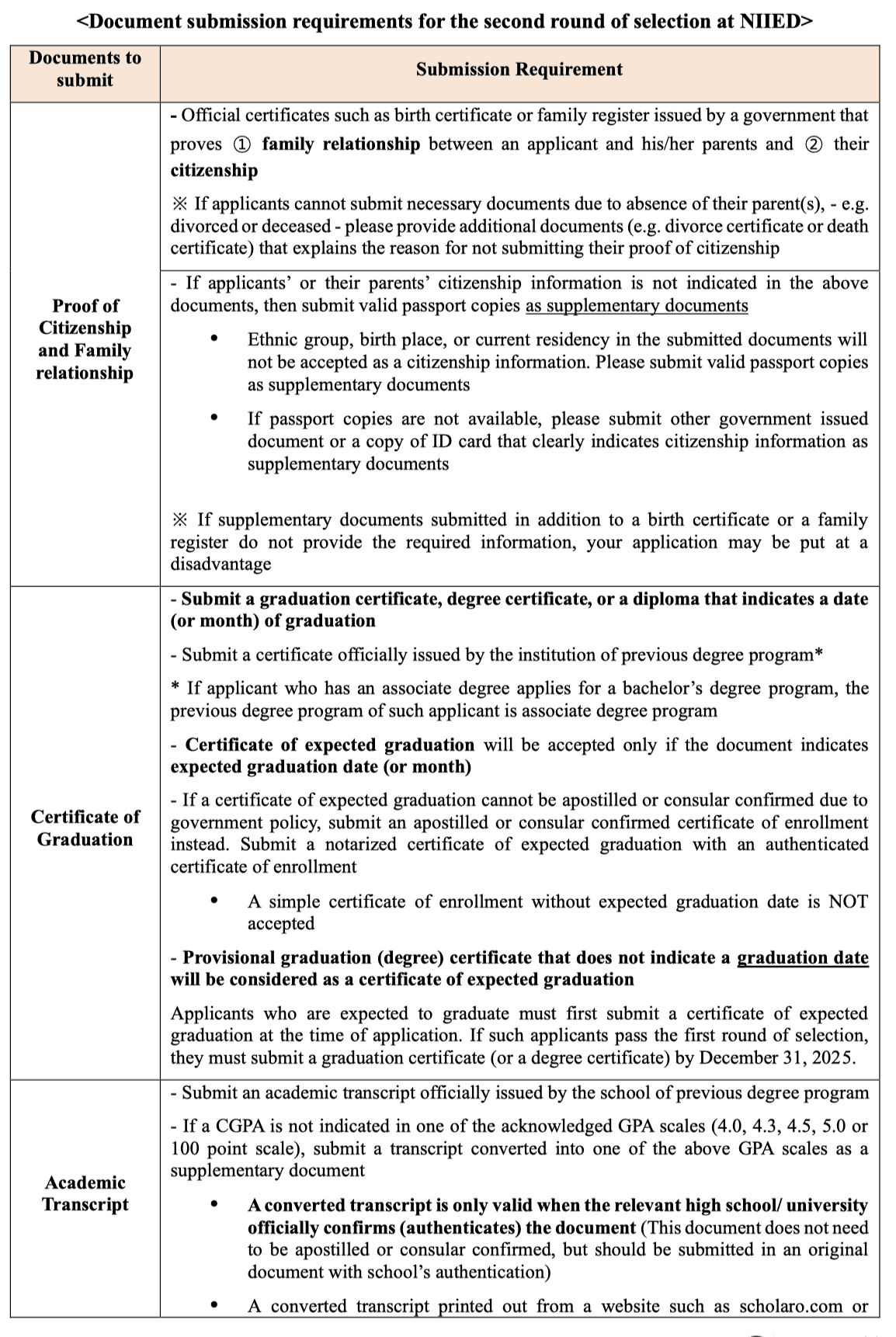
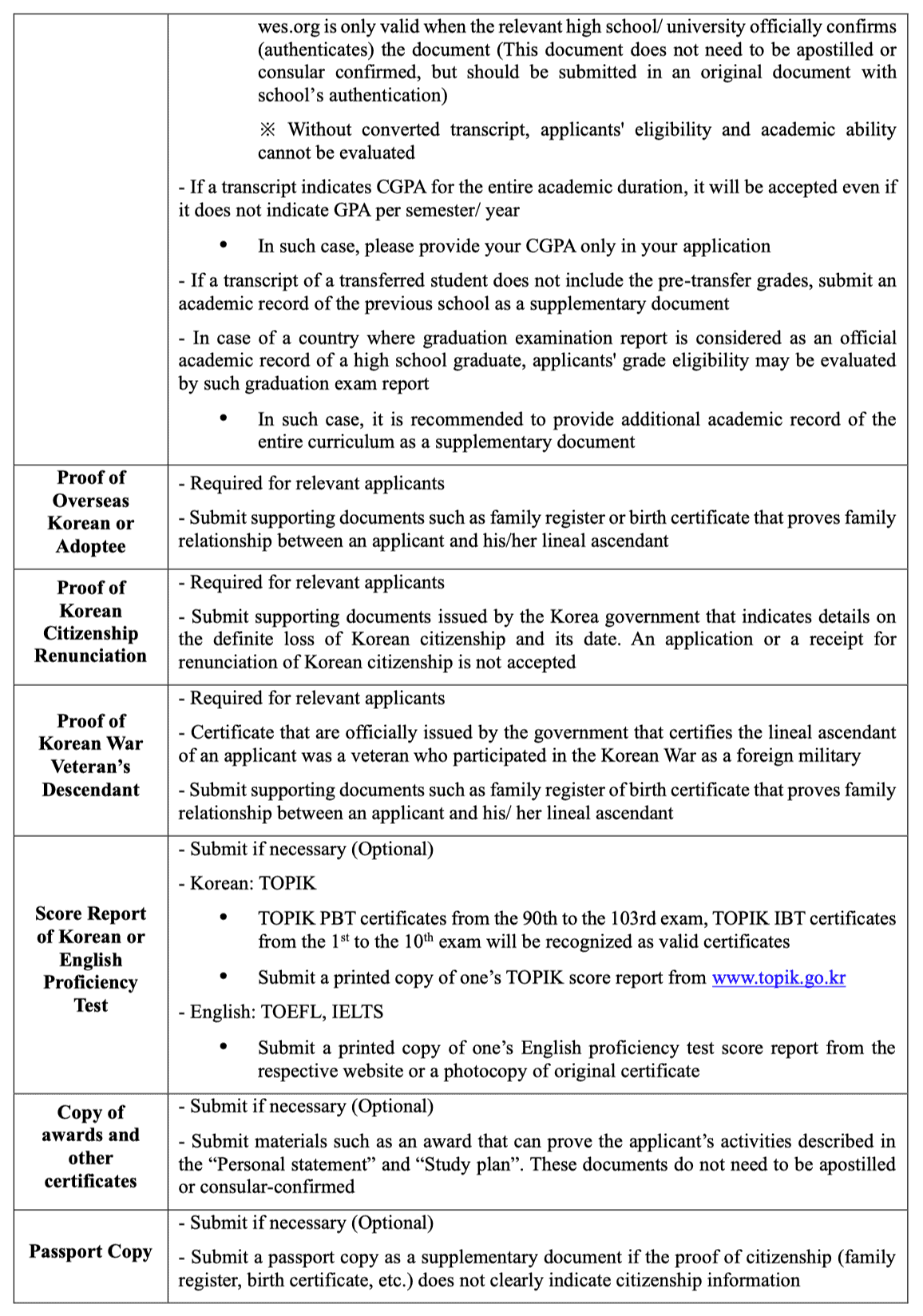
THINGS TO CHECK WHEN SUBMITTING DOCUMENTS
[Both Embassy and University Track]
- Applicants must put the official name of the university/department they are applying to.
※ Applicants can only apply among the universities and departmentwis listed in the “University Information” file. If an incorrect department is written on an application, such application may be disqualified in the evaluation.
- Applicant’s English name MUST match the name on their passport
(Attention!) Any discrepancy in applicant's name (family, given, middle name) will cause a delay in visa processing.
- Applicants must check the completeness of all application documents.
- Application documents must be submitted in the order of the “Application Checklist.” which itself should be the front cover of each set of application documents.
- Please number and label each document on the top right corner (e.g.) 8. High School Graduation Certificate (Consular confirmed).
- All documents should be submitted as a A4 sized (or letter sized) documents If a document is smaller than A4 sized (or letter sized) document, attach it on a blank A4 sized paper. If a document is larger than a A4 size document, fold the document into a A4 size.
[Embassy Track]
- Embassy track applicants must check the requirements when filling in desired universities.

※ Applicants cannot choose three different departments from a single university.
※ If applicants fill out a Type A university in a Type B section, their application may be excluded from evaluation.
- Please be reminded that if applicants choose all three universities among highly competitive universities, even if they pass the second round of selection, some can fail from all three universities in their final round of selection.
[University Track]
- University track applicants should fill in ONE university in their application.
EVALUATION
○ Main Points of Evaluation
Review of Qualification: Selection committee will conduct document examination (citizenship, level of education, academic grades, etc.) and verify whether an applicant is qualified for the program.
- Review of Competency: Selection committee will evaluate each applicant's competency through document examination and an oral interview.
○ Additional Points
- Applicants who hold a TOPIK level 3 or above will be given additional points (10% of the total allocated points)
- Direct descendants of Korean War veterans who participated in the Korean War as a foreign military will be given additional points (5% of the total allocated points)
- Applicants to science and engineering departments will be given additional points (5% of the total allocated points)
○ Evaluation Preference
- Overseas Koreans.
- Applicants from low-income families or underprivileged background
- Applicants who applied for a science and engineering departments
- (Relevant to associate degree applicants) Winner of a national level competition on technical skills
- Applicants who submit a high score of English proficiency test (TOEFL, IELTS)
- Applicants major linked to regional RISE plans or specialized industries
- Applicants recommended by metropolitan or provincial government heads (mayors or governors)

FINAL ANNOUNCEMENT
○ Announcement of Final Successful Candidates
- (Embassy Track) Universities should notify each candidate of the result of the third round by December 26, 2025.
※Candidates who fail from all three universities in their final round of selection will be disqualified from the program.
※ Embassy Track applicants who pass the 3rd round selection should notify their final choice of university to NIIED via online application system on the Study in Korea website by Friday, January 2, 2026.
※ All dates and times are based on Korea (Seoul) Standard Time. Embassy track applicants who pass the 3rd round of selection cannot change their university choice after final admission is confirmed
- NIIED will classify those who have obtained TOPIK level 5~6 as those who enter degree program. All other successful candidates will be arranged for a Korean language program
※ TOPIK PBT certificates from the 90th to the 103rd exam, TOPIK IBT certificates from the 1st to the 10th exam will be recognized as valid certificates from the 84th to the 97th exam will be recognized as valid certificates
- Among the successful candidates of the second round (university track) or the third round (embassy track), those who newly achieved TOPIK level 5 or 6 should send their TOPIK certificate to NIIED via email by Friday, December 26, 2025
- NIIED will notify the list of final successful candidates to embassies and universities by Friday, January 9
The list of final successful candidates will also be announced on Study in Korea website (www.studyinkorea.go.kr)
○ Final Successful Candidates will receive invitation letters and guidance on entry from NIIED.
◈ Important Notes regarding Successful Candidates
○ Final Successful Candidates’ withdrawal
- If a final successful candidate wishes to withdraw from the program after the final announcement, he or she should submit a signed letter of scholarship renunciation (free form) to the embassy/university that conducted the first round of selection
- Embassy or university should request NIIED a scholarship renunciation through an official document. Only then, the scholarship will be officially renounced
- Once a scholarship is renounced, it cannot be reversed. Final Successful Candidates who renounce their scholarship cannot reapply for the GKS program in the future. If the case of renunciation is repeated, the relevant countries will lose their GKS quota in the future
○ Certificate of Graduation
- Successful candidates are required to prepare multiple copies of apostilled or consular confirmed graduation certificate before their entry to Korea. Scholars may need to submit their authenticated certificate to their degree university (for an issuance of Standard Admission Letter), to an embassy (for visa issuance), and to Korean immigration office (for a renewal or an update of their status of residence in Korea)
※ This prevents scholars from returning to their home country to retrieve another set of apostilled or consular confirmed graduation certificates that are needed for an issuance of Standard Admission Letter after they are finished with their Korean language program
○ Final Successful Candidates who are currently residing in Korea
- Final successful candidates who have Korean residence visa (D-4, D-2, etc.) may not be able to receive a new visa for their Korean language program or degree program in Korea*
* To avoid any visa related issues, after the final announcement, final successful candidates who are residing in Korea should contact the Immigration office immediately to inquire about a new visa. Your inquiry should entail the necessary procedure and required documents in obtaining a new visa
- Entry airfare will NOT be provided to newly selected scholars who are residing in Korea at the time of the final announcement
○ Check applicable Laws and Regulations
- Final successful candidates must fully familiarize themselves with immigration and residency laws, academic regulations of NIIED and each academic institution
Academic regulation of each University | Refer to university website |
Visa and Immigration | www.immigration.go.kr |
www.hikorea.go.kr |
SCHOLARSHIP INFORMATION
◈ Period of Scholarship
○ Bachelor’s Degree Program: 5~7 years
- 1 year of Korean language training + 4~6 years of degree program
○ Associate Degree Program: 3~4 years
- 1 year of Korean language training + 2~3 years of degree program
○ Important Notes regarding Scholarship Period
- Applicants who submitted TOPIK level 5 or 6 will be exempt from a Korean language program
- Those who receive TOPIK level 5 or 6 within the first 6 months of the Korean language program will be exempt from the remaining 6-month language program and must start their degree program in the following semester (September 2026)
◈ Scholarship Benefits
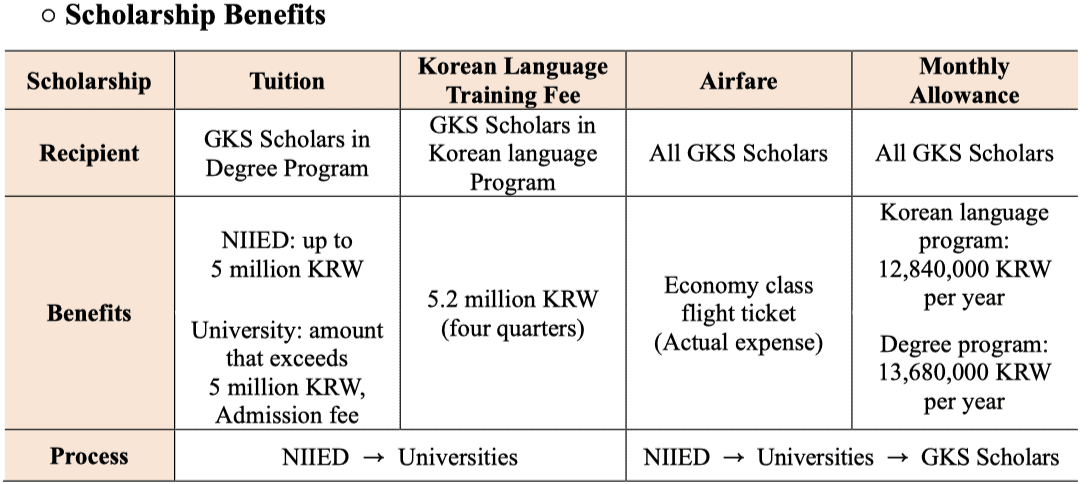
※ Monthly Allowance: All-inclusive subsidy of living expenses, health insurance, Korean proficiency grants, TOPIK application fee, settlement allowance, and degree completion grants
※ GKS Scholars who will be initially exempted the Korean language program with TOPIK level 5 or 6 will be given Korean Proficiency Grants automatically.
※ The cost of scholarship may changes
○ Important Notes regarding Scholarship Benefits
- Entry airfare will NOT be provided to newly selected scholars who are residing in Korea at the time of final announcement. Any domestic travel fees within a scholar’s home country and any international travel insurance for the trip to Korea will NOT be covered
- Entry airfare or visa application support will NOT be provided to scholars who enter Korea from a country other than the scholar’s own country of citizenship
- If a GKS scholar withdraws from the scholarship within the first 3 months after the enrollment to their university, one MUST return the full scholarship amount that he or she has received after being selected as a GKS scholar
CONTACT INFORMATION
○ Korean Universities for 2026 GKS-U Program: Refer to Appendix B and C ○ Global Korea Scholarship Center, NIIED: gksniied@korea.kr
<Address>
GKS Center, NIIED (Selection department of 2026 GKS-U) 191, Jeongjail-ro, Bundang-gu, Seongnam-si, Gyeonggi-do (13557) Republic of Korea
(우) 13557 경기도 성남시 분당구 정자일로 191, 국립국제교육원 국제장학센터
○ Other useful websites
Learning Korean | www.sejonghakdang.org |
Korean Portal | www.korea.net |
Ministry of Foreign Affairs | www.mofa.go.kr |
Visa and Immigration | www.immigration.go.kr |
www.hikorea.go.kr | |
Higher Education in Korea | www.academyinfo.go.kr |
DOWNLOAD ALL GKS UG 2026 DOCUMENTS
For University Track application process, you need to go to the website of the university where you want to apply and follow their process. You can find the website and contact details of all the university in the documents (that you can download from the link above). For Embassy track applications check the website of Korean embassy in your country.
Applicants are advised to read all the details very carefully and verify it once from the official website.
LINK: studyinkorea.go.kr



Really nice job-(
What if im not korean citizen or my parents too. Only my sister have the korean citizenship. How is that? Please help me, im interested????
they said you don’t have to be korean just one of your parents have the citizenship of these contries up there
hello.
sorry, how could i get a form of Global scholarship?
thank you.
Hi, I’m a namibian citizen, My dream was always to study in korea and im in my final year for my bachelors. i would love to go and study for my masters there. Is it even possible?
Is this opportunity open to American citizens?
Woww what a nice thing wish I could get one
Hi i am from nepal can i get that scholarship for further study.. i want to join in bachelor’s degree in korea so before 1 year i have been study korea language in world language university in nepal. I am also preparing 55th topik exam …
American citizen can’t get it?
What about American students?
I’m American and I received the GKS for a semester while at Inha University in Korea in the fall of 2019.
How did u apply for it plzzz
How can I apply for this scholarship from bangladesh?
Hi I am Bangladesh too.i want to apply for this.
Hello . My name is Shohruh. Im from Uzbekistan. I’m a student of university of oriental studies in Tashkent. Can you give me some information about how to transfer university to korean any universities. I want to continue my study in korea . It’s because it will be great experience for my future life . I’ll wait your reply. Thanks in advance
Hello, I am a Zambian currently learning Korean language here in Korea and I would love to receive the scholarship but the only problem is that my country is not among the listed countries… How can I register if I wanted to participate? Your response will be highly appreciated.
what about moroccan students ?
what about Morocco, i couldn’t find it on the list TT^TT that is so unfair !
Hello…am Nigerian and just got to know about this scholarship program, is it too late for me to apply or application is still on?.. ..hope you reply asap, thanks
Hey I’m kenyan and I’m really interested in this scholarship I would give whatever it takes
I would like to find out how to apply and if the scholarship is valid in 2018
Thank you
Hi, am from nigeria, i heard about this scholarship and i love it, south korea has always been my dream country, so how can i get all those forms
Hi it’s me again, i want to enroll for the 2018/2019 scholarship, how can i get the forms and i heard an information that we are to send our documents through posting but here it saying we have to submit our documents to d korean embassy in our country, i don’t know which one is true
when will application form for 2018-2019 be released
Hey I’m Sadek,I am liveing Bangladesh and I’m really interested in this scholarship I would give whatever it takes
I would like to find out how to apply and if the scholarship is valid in 2018
Thank you
How
Can a college undergrad apply?
its good,but why dont give chance CGPS greater than 2.00 even in intrance exam
Why I can’t found Iraq??! Please I’m from Iraq and I’ll do everything to get this scholarship I really need it . Please someone help me
where’s the application form please?
Is this not available to those in the United States?
Hello sir, can you explain what is Associate Degree, 2020 GKS Program for Associate Degrees?
I’m from Benin can i apply to this schorlarschip?
What about USA students? Are we ineligible to apply?
We tested and the links seems to be downloading fine. Can you please try on a different browser?
How thé applicant must have a passport
How cal i fing the application form and NIIED pledge
Wher can i get the application form1
What is the NIIED PLEDGE
Do i have to print application form and fill it the go to korean embassy is it right?
I would like to have the opportunity to apply for a scholarship but my country is not on the list. I am from Costa Rica.
I’m an Eritrean emigrant residing in Ethiopia. Can I apply for the scholarship?
Can I apply for an undergraduate course if I were shifting courses? I finished 1yr of architecture school and decided to change courses. What gpa should I present to them, my highschool grades or my 1st year grades?
why not Malawi?
Hi!
I am Majok thon from south Sudan, it seem that my country is not among the shortlisted nations eligible for GKS portal?
Does it mean South Sudan is under Sudan?
When does 2020 application form come out?
Y los que estamos en otra parte de Centroamérica, como Costa Rica?
I want to apply for doctorate DEgree but failed to retrieve the information. kindly send me useful links
hello
why is it the the Korean government restrict the scholarship to certain countries. i am from Liberia located in west Africa and have a grate interest in your scholarship program.
how can I apply for this scholarship
When will 2020 applications begin?
sir, when will the application form of 2020 and 2021, will release.
Hi is the 2020/2021 application for the korean embassy scholarship open? If no when will it open?
OMG! Can i not apply or choose medicine?
This is so dissapointing this was what i dreamed of all my life.
Can’t this rule be improved?
All is good and i appreciate this program and that’s the reason why i chose it but after this i really gave up hope!!
I wish to get scholarships??
Are people from the USA able to apply for undergraduate ?
Can I apply for undergraduate degree in kgsp after 12th
in India we get our marksheets of our high school in MAY. can we submit our pre boards marksheets. kindly plz guide me
Hello zunaira have you got any answer ?can you please guide me that how can i get the application form?please tell me
UG application will be out at SEPT…So I think there won’t be any problem regarding the documents….
Hi how can i apply for this scholarship ?kindly guide me
How could i get the application form?
Hi I’m from Nepal. I want to apply this. Could you please help me which korean university gonna provide in Nepal? I want to submit the document.
Hlo, please tell me how it is possible to summit my original certificate of high school and if i need my orignal certificate in future than what I do .
Hello, I’m from Bangladesh. I’m very much interested to complete my undergraduation study in Korea. What information will be needed for that?
Hello Apu, I can talk to you about GKS
I’m from India and it’s too late for me to have the scholarship as due to covid I have recently passed my high school I want to receive bachelor’s degree from korea. Can I?
I’m presently in second semester (sociology) can I apply for this .
And if yes,when can I apply for it
Can i apply for scholarship with business and management major?
I am planning to study as an undergrad in SNU College of Medicine. I am currently taking in Premedical Classes in my Highschool. Exempting the 2-years for premed, College of Medicine only takes 4-years in SNU. Will GKS sponsor an applicant like me for College in SNU as a medical student?
Will GKS sponsor an upcoming medicine student of SNU after he/she finishes his/her 2 year Pre med in SNU? Leaving only 4 years of College in the Medicine Department?
Good high school
Is GKS Scholarship applicable for Medical students who want to get their Undergraduate Bachelor’s Degree (MBBS) from Korea?
plzz someone tell me the Deadline for batch 2022
Hi, if I’m a diploma holder and I going to apply this GKS undergraduate, would them will deduct my year of study?
To which university we can apply medicine through embassy track? As far as I know , there is only SNU.
Hi sir,
Now I had completed my 12 with 85.6 can we able to apply for GKS in December I know the application time is out but if there is any chance to apply so kindly requested to you please tell me
Good
How could i get the application form?
Hello, how are you! My name is Tina. I live in Ethiopia. I want to come to Korea and study. I am a 11th grade student and I am 23 years old. What advice would you give me? Come and study there? I am a social student.
Hello sir..
Where I have get first round selection results?
Hello sir..
Iam B. Navya.
Where should I get first round selection results??
After bachelor’s (BS) can we apply for a master’s degree
I don’t have birth certificate. What can i do?? I have my voter id card though
GPA-3.92 Out of 5.00. Can apply
Anyeong
Am Risper and interested with the scholarship for associate degree program and am not eligible because of my age am 27 . What do i do?
Gamsahamnida.